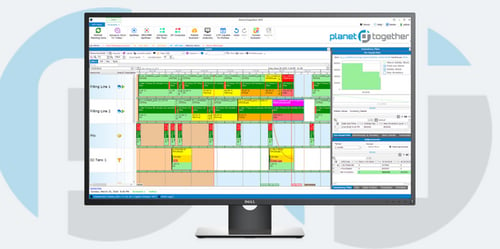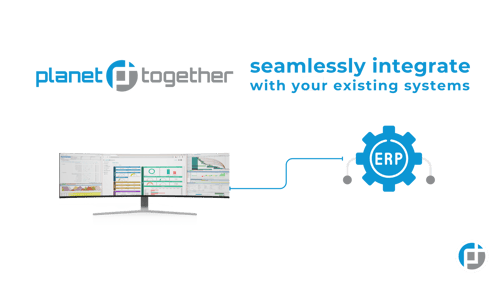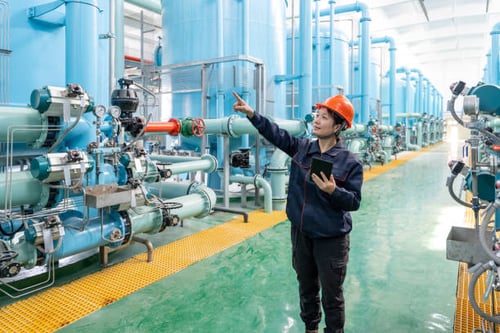
Driving Cost Efficiency in Chemical Manufacturing: A Smart Approach for Plant Managers
Chemical manufacturing is an industry built on precision, safety, and scale—but increasingly, profitability hinges on cost efficiency. From raw material volatility to energy consumption and regulatory compliance, costs mount quickly if not managed strategically. For Plant Managers, this means constant pressure to reduce waste, optimize production, and align with enterprise systems to gain real-time operational control.
In this landscape, advanced planning and scheduling (APS) systems like PlanetTogether, when integrated with ERP platforms such as SAP, Oracle, Microsoft Dynamics, Kinaxis, or Aveva, become crucial allies. They don’t just digitize workflows—they transform plant operations into lean, cost-effective powerhouses.
Understanding the Cost Equation in Chemical Manufacturing
Before diving into solutions, it's important to grasp the key cost drivers Plant Managers face:
Material inefficiency and overstocking due to inaccurate demand planning
Downtime caused by poor production sequencing or unplanned maintenance
Labor inefficiencies from reactive scheduling and overutilization
Energy overuse, especially with batch or continuous production lines
Compliance-related waste from quality deviations or procedural oversights
Each of these areas represents an opportunity to optimize. But optimizing in isolation doesn’t work—you need an integrated strategy.

Enter PlanetTogether APS: Built for Chemical Complexity
PlanetTogether APS provides dynamic scheduling and planning tools designed to handle the complexities of chemical production, such as:
Batch processing and variable lead times
Hazardous material handling
Strict regulatory traceability
Multi-stage production and capacity constraints
Its real-time scheduling engine continuously adjusts for changes in demand, resource availability, and machine status. But its full power is unleashed when integrated with leading ERP platforms.

Integration in Action: Aligning PlanetTogether with ERP Systems
Imagine you’re managing a mid-sized chemical plant using SAP for enterprise-level financials and supply chain operations. Standalone systems cause data silos—your shop floor doesn’t talk to your planning tools. This is where integration comes in:
SAP + PlanetTogether
When PlanetTogether is integrated with SAP:
Material and demand data flows seamlessly from SAP into APS
You can model alternate production sequences that SAP alone can’t manage
Schedulers get a real-time view of inventory, labor, and equipment capacity
This results in faster decision-making and less waste from trial-and-error scheduling.
Oracle + PlanetTogether
Oracle users benefit from:
Forecast synchronization with actual production runs
Better visibility into multi-site coordination for distributed manufacturing
Improved scenario planning, which helps reduce emergency orders or costly reruns
Microsoft Dynamics + PlanetTogether
For chemical plants using Microsoft Dynamics:
Integration allows tight synchronization of MRP outputs with floor-level scheduling
Reduces excess buffer inventory
Increases throughput with finite capacity scheduling
Kinaxis + PlanetTogether
With Kinaxis, the integration adds:
End-to-end visibility across the global supply chain
Enhanced demand sensing and planning accuracy
Real-time feedback loops between planning and execution layers
Aveva + PlanetTogether
When paired with Aveva’s manufacturing operations management suite:
Enables production monitoring and scheduling adjustments in near real-time
Supports compliance logging and quality traceability
Ties into energy management platforms for process-specific cost analysis

Five Ways Integration Boosts Cost Efficiency for Plant Managers
Here’s how a Plant Manager directly benefits from a PlanetTogether+ERP integration strategy:
1. Reduced Inventory Holding Costs
By aligning production scheduling with actual demand forecasts and material availability, integration minimizes unnecessary stockpiling—a common cost sink in chemical operations.
2. Shorter Production Cycles
Smarter sequencing, enabled by APS algorithms, reduces setup times and changeovers, especially in multi-product plants. Fewer changeovers mean lower downtime and energy use.
3. Optimized Labor Utilization
Real-time scheduling shows managers exactly where and when personnel are needed, reducing overtime costs and minimizing idle time.
4. Less Waste and Scrap
Tighter quality integration with ERP systems ensures standards are met with fewer rejections, thanks to predictive insights and proactive deviation management.
5. Energy Efficiency Gains
For processes that are energy-intensive, especially in batch manufacturing, optimized scheduling avoids peak energy consumption windows and aligns production with low-cost energy periods.
Implementation Considerations for Plant Managers
Involve Cross-Functional Teams Early
Cost efficiency affects every department—procurement, operations, quality, and maintenance. Bringing them into the integration project ensures alignment and faster ROI.
Map Current and Future States
Know where your current pain points are. Use PlanetTogether’s modeling tools to simulate cost-saving scenarios before go-live.
Start with a Pilot Line
Instead of full-scale implementation, begin with a high-impact product line. This allows your team to build confidence and fine-tune integration before scaling.
Train for Autonomy
The system should empower your team, not just automate tasks. Train schedulers and supervisors to interpret dashboards and act on insights independently.
For Plant Managers, improving cost efficiency isn’t about cutting corners—it’s about smarter orchestration of resources, from personnel to equipment to energy. By integrating PlanetTogether APS with platforms like SAP, Oracle, Microsoft, Kinaxis, or Aveva, you gain real-time visibility, proactive control, and measurable savings.
Chemical manufacturing will always be complex. But with the right tools and integration strategy, you can turn that complexity into a cost advantage.
Are you ready to take your manufacturing operations to the next level? Contact us today to learn more about how PlanetTogether can help you achieve your goals and drive success in your industry.
























LEAVE A COMMENT